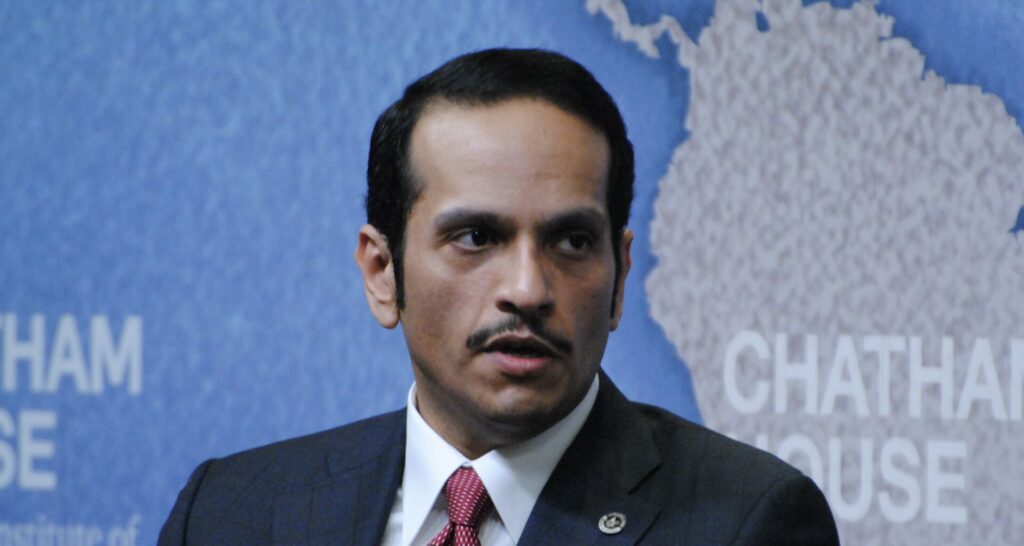World Cup critics ‘preaching from a distance,’ says Qatar minister
Qatar’s foreign minister has responded to criticism of the host nation’s homophobic laws: “sports should never be politicised.”

Sheikh Mohammed bin Abdulrahman bin Jassim Al Thani, Qatar’s Minister of Foreign Affairs, says negative coverage of the upcoming World Cup amounts to “misinformation”.
His comments come after mounting backlash against the World Cup host nation. In Qatar, homosexuality remains illegal and punishable with up to three years in prison or death under Sharia law.
He goes on to say that people “preaching from a distance is not a solution”.
He adds in an interview with Sky News: “Calling to boycott the World Cup, or those who are not coming to the World Cup, it’s their decision at the end of the day, but why deprive the people and the public from attending and enjoying the World Cup.”
Asked about the concerns raised about Qatar’s human rights record, he replied: “What kind of message are they sending to their own public?”
“What about their own problems within their countries, which they are turning a blind eye?” he continues. “Honestly, not me or the Qatari people only, but there’s a lot of people from around the world who are just seeing this as a sense of arrogance.”
He also notes that the arrogance stems from people unable to “accept a small country from the Middle East has won the bid to host the World Cup” and that he believes “sports should never be politicised.”
On LGBTQ-specific concerns, Mr. Bin Abdulrahman al Thani says, “Holding hands is not a public display of affection as far as I know.” He adds that public displays of affection are banned for straight couples too.
When asked about his thoughts on players, like England player Harry Kane, wearing a OneLove armband to stand in solidarity with the LGBTQ+ community, the Foreign Minister stated that “on the pitch, it’s FIFA’s rules, not our rules.”
He goes on to echo the sentiment of Qatar officials who stated LGBTQ+ fans would be free to visit for the World Cup.
However, these early messages have been undermined by a senior Qatari security official who said flags may be confiscated “to protect them [fans] from being attacked for promoting gay rights”.
“We have our cultural norms, our society and what they like and don’t like… yet we’re respecting everyone and expecting everyone to respect our laws,” Bin Abdulrahman al Thani emphasised.

Despite his comments, in October Human Rights Watch (HRW) reported there had been “six cases of severe and repeated beatings and five cases of sexual harassment in police custody,” against LGBTQ people in Qatar.
Qatar denounced the allegations as “categorically and unequivocally false.”
Additionally, LGBTQ activist Peter Tatchell was arrested (25 October) in Qatar after he staged an LGBTQ rights protest; authorities in Qatar deny the arrest, calling reports “completely false and without merit”.
Earlier this year, 16 LGBTQ organisations signed an open letter stating the protections for the LGBTQ community in Qatar are inadequate.
From sports stars to politicians, the likes of Labour’s Keir Starmer and English footballer Beth Mead, have shared they will not be attending the World Cup.
Mead told BBC Radio 4 on Friday (4 November) that she will not be “backing or promoting” the World Cup: “It’s disappointing in the sense that there’s no respect on a lot of levels, even though it’s a game of football.”
Footballer David Beckham faced criticism for supporting Qatar’s hosting of the World Cup after signing a deal to promote Qatari culture and tourism.
Numerous people have called on him to reconsider and step back from the deal, including recent Attitude Man of the Year, Josh Cavallo, who called on the former England player to “speak out” and support the LGBTQ community.
The World Cup takes place in Qatar from 21 November to 18 December 2022.
